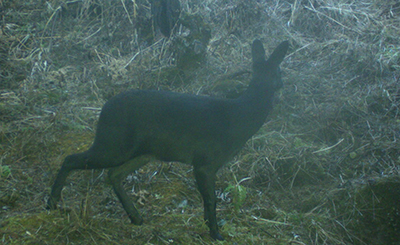 With a mission to save the endangered alpine musk deer in the country, 41-year-old Bhutanese wildlife biologist, Phuntsho Thinley won the prestigious Whitley Award today. He is among the six conservationists selected from more than a hundred applications worldwide this year.
With a mission to save the endangered alpine musk deer in the country, 41-year-old Bhutanese wildlife biologist, Phuntsho Thinley won the prestigious Whitley Award today. He is among the six conservationists selected from more than a hundred applications worldwide this year.
The winners will receive a fund worth £40,000. The Whitley Awards often referred to as ‘Green Oscars’, are awarded annually to individuals from the low and middle-income countries by UK-based conservation charity, the Whitley Fund for Nature.
Phuntsho works for the Royal Society for Protection of Nature (RSPN) and this is his 18th year working in the field of wildlife conservation. Winning the award, he shared that this is a strong testament to the global recognition of the exemplary efforts to conserve nature and a tribute to the strong conservation policy.
“While graciously accepting this prestigious award, I strongly commend the Whitley Award for their tremendous contribution to global conservation efforts. I dedicate this award to the benevolent Bhutanese Monarchs for their far-sighted vision and unwavering support towards nature conservation,” said Phuntsho Thinley, a Wildlife Biologist with the RSPN.
 His project of protecting the endangered musk deer is located at the Lingzhi Park Range, a three-day walk from Thimphu. Despite being a protected species under the Forest And Nature Conservation Act of Bhutan, the alpine musk deer are targeted by poachers for its musk pod, with an estimated 100 deer killed in the country each year.
His project of protecting the endangered musk deer is located at the Lingzhi Park Range, a three-day walk from Thimphu. Despite being a protected species under the Forest And Nature Conservation Act of Bhutan, the alpine musk deer are targeted by poachers for its musk pod, with an estimated 100 deer killed in the country each year.
“Despite the strong legal prohibition, some of our men secretly venture into the deep jungle to hunt for precious animals including the alpine musk deer. Found in the alpine meadows and subalpine forest above 3500 meters, this unique deer is heavily poached musk pod which is a scent gland only found in the males. It is priced more than gold in the international black market for its medicinal properties. The popular method of hunting is by laying hundreds of traps along its paths indiscriminately killing several males and females from just one location. If unchecked, poaching alone can push the musk deer to the brink of extinction,” he said.
The award money will be used to further step up the preservation of the endangered species.
“Thanks to the Whitley Award. I now have the opportunity to save the endangered musk deer in one of the poaching hotspots in Bhutan. I and my teammates will be working in partnership with the park authority and the local communities living alongside the musk deer habitat to raise their awareness of the species ecological and conservation significance and garner their support in conservation efforts mainly to ramp up the anti-poaching patrols. Protecting this species will also indirectly help in the protection of the iconic tiger and snow leopard,” he added.
While the winners will receive their funding now, they will be invited to attend a ceremony and related events in London later this year to celebrate their achievements, should circumstances allow. Rebecca Pradhan was the first Bhutanese to win the Whitley Award in 2008.
Sonam Pem









